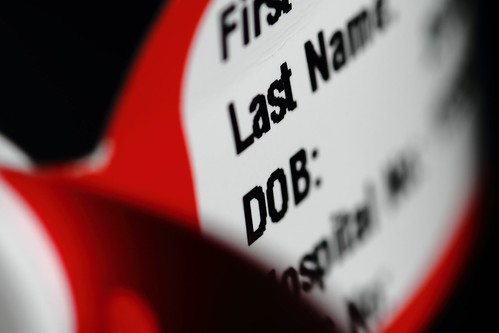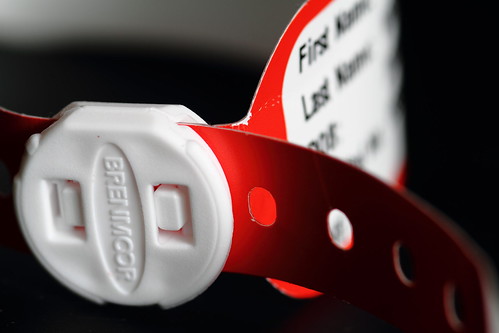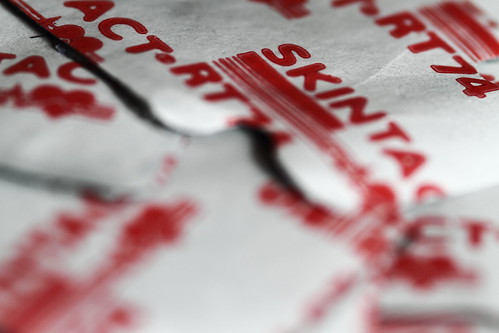Cross posted at Diary of a Goldfish
Link to the MP3 for download
Full Transcript:
D: Hello. We've decided to do an audio-review
of the film, Catfish, in order to test out Stephen's new microphone.
The film Catfish is one where there's no way to review it without
major spoilers, so if you want to watch the film and enjoy it in its
completeness, you need to stop listening now.
S: Quite right. And thank you very much for the microphone. It's very
beautiful, thank you.
D: You're welcome. Would you like to tell the listeners – I was about
to say “viewers” - would you like to tell the listeners what the film
is about?
S: I don't think the microphone is that good.
D: No.
S: The film is about – it's a documentary following a photographer,
who has an office in New York, who strikes up an on-line friendship
with “Abby” who is a seven year old girl from an American state
beginning with M.
D: Michigan.
S: Michigan. I keep on forgetting this. We've had a trial run and I
came up with Massachusetts and
D: Demure
S: Des Moines. Even I know that there isn't an American state called “Demure”
D: There isn't an American state called “Des Moines”.
S: Is there not? Is that a city?
D: I don't know but I know there aren't any
S: I so want to Google it and I can't really do an “Excuse me a minute
while I get out my phone”
Right so, Michigan.
D: It was Michigan.
S: Michigan. And he was in New York and apparently there is quite a
large space between those two places.
D: Cause it's in America.
S: Cause it's in America and America is big.
D: It's all spaced out.
S: Is it? News to me. Okay. So they strike up a friendship via
Facebook. She paints his photos that are published in various
magazines.
D: Makes paintings from his photos.
S: Yep, paintings of his photos. And he then becomes friendly with
her mother Angela and her sister Megan and in fact the relationship
with Megan becomes very romantically-inclined.
D: Yes, I think he thinks he's in love with her.
S: Yeah. And the thing is filmed by his two friends who both use his
office space. But the documentary starts out as really looking at his
relationship with this family. They call it the Facebook family
because he “friends” them all on Facebook. And we see all of these
lives meshed together. A brother who worries about how he's treating
Megan. And it's quite in depth and detailed. But the action takes a
bit of a tumble when he realises that a song that Megan claims to have
produced within about twenty minutes or something - he requests a song
D: Yeah, he requests a cover of a song and suddenly
S: Tennessee Stud, I believe it was.
D: Yes it was.
S: Yeah, see I can remember that. And Tennessee is somewhere in America.
D: And uh, yeah. No it wasn't, it's the name of a playright, Tennessee Williams.
S: Oh I see.
D: I think perhaps they named a place after Tennessee Williams.
S: It makes sense.
D: It's a bit like Denver and John Denver.
S: And Denzel Washington.
D: Yeah, I don't know, I think perhaps Washington was there before
Denzel Washington.
S: Okay. So, this song. He receives this song as an MP3 or whatever.
And I can't remember why but they go looking for other versions and
they actually find the song on Youtube.
D: I think it was a different song. They were getting lots of songs
and it was a different song that they searched for but they realised
that the recording sounded exactly the same as a cover on Youtube.
S: So they'd recorded the audio stream from Youtube and then sent it
on to him. So initially he thinks, “Oh no, this love of my life is a
plagiarist.” But the story unravels more and he ends up with his
friends – because they're relatively near to where these people live –
going and dropping in on them and so the secret unravels.
Now we were, prior to this point, or certainly you were convinced that
this was a “Mockumentary”.
D: Not a Mockumentary! I thought it was a “Blair Witch” style fake
S: A spooky unsettling horror type thing.
D: Or “Spinal Tap”. I thought it was a drama pretending to be a
documentary. And it is beautifully done.
S: Yes it is beautifully done. The filming, some of the scenes
D: The use of technology, the use of Google Earth when they're moving about
S: And Street View to kind of focus in on these places
D: Really nice use of tech, which is still quite rare in films, to use
on-line technology that looks like the on-line technology that we all
use. But it just, it is real. It really was real. I think we
realise this, without a doubt, when we finally meet the character of
Angela.
S: Or the person who is really Angela.
D: The person is really Angela, who doesn't look anything like the
photographs we've seen. And turns out to be responsible for all these
identities.
S: Twelve separate accounts on Facebook.
D: Which include the daughter. She does have a daughter, but the
daughter doesn't resemble – well she physically resembles but she
isn't a painter, she isn't this bright spark that has been having this
e-mail correspondence with the photographer. And the older daughter,
who the photographer believes himself in love with, as well as a
brother, some cousins, some friends. And she's fabricated the whole
thing. And we were talking about the way that that's changed. You
know, having been on-line since the late 90s, I think we feel a lot
safer with the people we meet on-line now because we are so
interconnected.
S: Yeah, the evolution of social media has created a smaller degree of
separation. Just the other day on Twitter, someone I follow who is
involved in electric vehicles ended up retweeting from someone I am
aware of through disability activism so the reality of both people
becomes more solid as they're both linked together.
D: And the people, certainly the people I know. I mean, I don't use
Facebook but the people I know through blogging and Twitter and all of
that, there are sort of strange connections between people. But you're
not having to appraise one person who could be fooling you, if they're
fooling you, they're fooling a lot of people. Because they're
interconnected. But of course this woman had created an entire
network of people, all of which were backing up this narrative. I
mean, she was a frustrated novelist really, she didn't know that
that's what she should have been doing with her time. But she was
managing twelve Facebook accounts and presumably Twitter accounts and
things, as well as having two mobile phones so she could pick up the
phone as herself and she could pick up the phone as her imaginary
daughter. And the whole thing, all these characters and interactions
and everything they were doing amongst themselves were an entire
fabrication.
S: And she had been the person producing these paintings. Really out
of a love for this
D: She was very much in love with the photographer.
S: He was – I think with his interest in dance, which she shared and
D: They did have a lot in common.
S: They did have a lot in common and they seemed to get on very well.
D: Except for the fact that she had obviously deceived him in a
terrific way. She'd made him fall in love with someone who didn't
exist. And she was terrifically in love with him.
S: Whilst being a married housewife. But we begin to understand her
situation as we begin to her house in – what I would say was a very
isolated community?
D: It's difficult to judge.
S: It's difficult to judge, but. And looking after, it would appear
looking after full time, two young men who were both physically and
mentally disabled. And she seemed to have a very empty life? Is that
fair?
D: I think she had a very frustrated life. She obviously had a lot of
time on her hands. And I think, compared to the life of a photographer
working in New York, going to all kinds of Arts things, I think she
felt very frustrated. She didn't have the access to that kind of art.
She had a very frustrating life.
S: And this had driven her to trying to create something better,
something richer. Which I think is a symptom of society that reduces a
degree of social care which is necessary. People need the connections
she was creating. People need rich lives.
D: She was one of these characters that you do know – I think, when
she appeared, you knew straight away that there was no doubt that this
was a genuine documentary because she was not a character you normally
get in films. She was a compulsive liar really, but she wasn't a
crafty criminal mastermind type. She sort of – she was a very
sympathetic character, you felt quite sorry for her even though you
could tell that she was
S: And even the break down of her life on film was heart-breaking.
D: It was.
S: Because she's confronted very gently. They did do very well. They
weren't angry with her.
D: I think they were a bit angry but they were keeping it under control.
S: They weren't vindictive, sorry.
D: No, they weren't malicious or... They could have humiliated her or
just bamboozled her with what she'd done.
S: Yeah. But the truth is relatively gently brought to light. And
she's given the opportunity to almost come clean. She doesn't quite
get there, she does produce quite a few more lies.
D: One of the things that really shoke – was very familiar was um...
She had very long hair which she was very proud of. And she'd sent
them a photograph that was supposed to be her and the only similarity
between that and her was that the woman in the photograph had very
long hair. She was complimented on this and she said, “Well, I won't
have it for long because I'm on chemotherapy.” Which really kind of
struck a chord because, of all the sort of stories that you hear of
romances that turn out to be other than they are, on-line, cancer does
seem to be a recurring theme.
S: And it also does stop any further conversation because it is the
topic to end all topics.
D: Yeah. In the late 90s, the very first one I came across was a
friend, a sort-of friend who had this girlfriend who was supposedly in
hospital dying of cancer, although she had internet access, which
seems unlikely given the time. And she had a PO Box address which
seemed a bit suspect. And it seemed unbelievable then to everybody.
Most of us hadn't been on-line very long and we just couldn't see how
someone could get sucked in like that. But the guy felt himself in
love.
And then a couple of years later there was another friend who was
exactly the same – well not exactly the same thing happened. But again
there was this guy who had seemed to have had a very tragic life and
then he had cancer and there wasn't much time and so the whole
relationship was very intense. And of course people do have cancer
and people do have very intense relationships at the end of their
lives but it does sort of, it is a bit too familiar, isn't it?
S: So this was the film. It was quite shocking. We were both – we
chose it because it would be – we had a choice between this and Titus
Andronicus and I think we went with the lighter option.
D: I still think it was probably the lighter option than Titus Andronicus.
S: Well you say that. Yeah perhaps okay. But we were both quite shocked.
D: Could we do like a Facebook version of Titus Andronicus?
S: Um, well Livinia does have her hands cut off which would limit her
options for, anyway. So we were both quite shocked by the end of the
film and as well as wanting to test the microphone, we wanted to talk
a bit about it because it moved us.
D: Yes, it was very moving. And we talked about, I mean we've both
been on-line since our... I don't know, how old were you?
S: I was a teenager still.
D: Well, I was a teenager still. I was going to say late teens and I
thought perhaps it was your mid teens.
S: It may have well been mid-teens.
D: When you were young and naïve.
S: And I was called “The Very Cowardly Lion”.
D: That's really – the very cowardly lion?
S: The very cowardly lion. I know, it's really sad isn't it? But anyway.
D: [pause] Yes. Um.
S: That's a bit of a stopper, isn't it? Sorry.
D: That's a bit of a stopper.
S: I wasn't. I was just called Stephen. That was what my username was,
it wasn't the Very Cowardly Lion. And I didn't go onto very early
chatrooms and not say much apart from “Hello, I'm the Very Cowardly
Lion.”
D: Yeah. I can't remember an awful lot of my old usernames and things.
S: That's probably for the best, I now feel very embarrassed. In fact
I may cut this bit.
D: I don't think you should. Because people will want to Google it to
see if there's any evidence of you.
S: I bet there isn't. That was in the days of Netscape.
D: Wow. So were you ever tempted to be someone you weren't?
S: Well I almost signed up for Second Life, after a friend of mine
joined. But I think there's a desire often with, especially people
who are ill and could be – aren't very satisfied with there lives, to
try and create a new, more fulfilling existence. And the internet's a
wonderful tool for this, because you don't have to show you're
physical form. You can build a physical form that works with your
idea of what you want to be.
D: Amanda Baggs, who blogs at Ballastexistenz. She is non-verbal
autistic and she is a wheelchair-user and she's talked about using
(bless you) using Second Life and that experience being completely
different, because she is non-verbal, to be able to talk and interact
and not be a wheelchair-user and her whole experience of life is
completely different.
S: And it allows an extra dimension to life.
D: I don't think that is on any level pretending to be other than you
are. I mean, Second Life, it is to do with a version of yourself, I
don't think it's even an idealised version of yourself.
S: It depends on the person.
D: Yeah. It's a bit like in the Matrix when he incorrectly says, I
think he says, “It's a mental picture of your digital self” when he
really means – it's one of those many points in the Matrix when he
gets his words wrong.
S: I did have a Yahoo chat account with several different identities.
And I used them for times when I didn't want to be contacted.
D: I think organised crime is another issue altogether.
S: Yeah, back in the days of the Yahoo Mob, yeah. No, that was when I
wanted to. When I was unable to socialise and yet wanted to be around
some form of people.
D: Like in a petri dish.
S: Yeah, when I used to experiment on these poor tormented internet
souls. I used to a put on a disguise to just sit quietly. But I
didn't use that to become someone else. I just had one that was a
Latin term and one that was actually a couple of words from a
Portishead lyric, both of whom allowed me to sit quietly in a room and
not be bothered.
D: Was that “Machine Gun”?
S: Um, no. It was “slave to sensation”. Which, if you've ever been to
Yahoo chat, makes you sound like, um...
D: I think we know what that makes you sound like.
S: And so you never ever get bothered, which is wonderful.
D: I'm quite surprised you don't get bothered. I'm quite surprised
people weren't interested in what particular sensations you were slave
to.
S: Anyway, that was a long time ago. And uh, sorry, I have forgotten
where I was.
D: I've pretended to be a man on-line.
S: Have you?
D: Yes, I put on a deep voice like this. [convincing masculine voice]
Hello. Hello darling. [resumes feminine voice] That's my
S: It's very convincing! I can almost hear the chest hair.
D: But I've not actually
S: Just a warning to anyone who hasn't watched the film and yet is
still listening to this, in which case shame on you. You do see an
awful lot of chest hair. He has, he has got an awful lot and you
know, in this society where chest hair is banished from the front of
magazines, it is quite shocking.
D: Okay. I have pretended to be a man on-line but not actually, to be
honest I didn't really try hard. I just let people refer to me in the
masculine and call me mister and so on, and not challenge them.
Especially when I was younger, I think I very much felt that people –
especially on political matters – I felt people took me more seriously
if they thought I was a man. I wouldn't do that now.
S: I'm glad.
D: Because I think the sort – I mean it's an implicit bias, so it's
not actually people who are horrendously sexist, but at the same time
I think it's better that I might be taken a little less seriously but
that people see that my point of view is that of a woman.
S: Yes.
D: A lady. I think it's particularly interesting for people who
S: have some sort of internet existence.
D: Yeah and also know people who are – I have know people who are – I
mean we've obviously both been isolated at different times. But
people who are isolated who turn to online communities to resolve
isolation and there's nothing unhealthy about that in itself. But I
think it sort of demonstrates where it can go.
S: The power of honesty. The importance of honesty. And the
inevitability of lies.
D: Because you meet people and you don't believe who they are. I mean
you meet people in real life and you don't buy, you know, there are
lots of people who are full of...
S: Yeah.
D: We need a word that isn't a swearword to describe...
S: I do have that Bleep App on my phone. But I'd have to go and get my phone.
D: Yeah. Okay, how about you go “Beep” and I say it? There are people
who are full of b....
S: [silence]
D: You've got to beep! There are people who are full of b...
S: I think you're all very glad I didn't beep, aren't you? Because
that was far more funny as it was. I think they get the point.
D: There are people who are full of [beep]. Can we beep that afterwards?
S: There are indeed. There are people who lie, and we do have to be
careful. But we also have to be caring because often people lie for a
reason, a reason that is... well no, often don't, some of them are
just idiots.
D: But lots of people do tell lies for a reason. Unfortunately
though, they do tend to carry on lying, in experience. I think this is
the thing. I think they get found out and, because it's a defence
mechanism and as such it is very difficult to help people who tell
lots of fibs.
S: So I think that's just about it.
D: Yes, I think it is.
S: So thank you for listening.
D: Yes, thank you. I hope we haven't wasted too much of your day.
S: And if we have, tough luck.
D: Yeah, you should have spent it on Facebook. [phone noise] Oops! Sorry.
S: And with that beep of modern technology, we bid you Adieu.
D: Goodbye.






